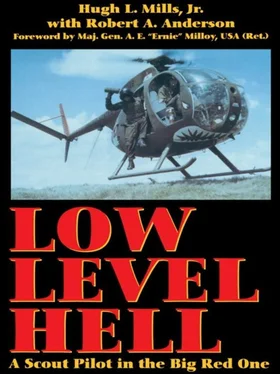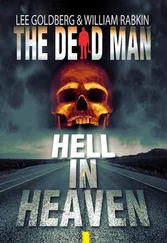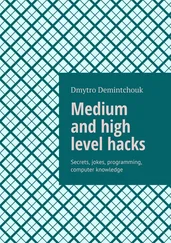He was smoking! I went into the operations hootch just behind Ronan, and Herchert was waiting for me. He stuck his face right into mine and stared me in the eye. Then, as if to punctuate his words, he poked me in the chest with his finger while he raked me over the coals. “You are not a gunship. I didn’t teach you to be a gunship, and you had no business running in there hot like that. The gun on that scout ship is going to get you killed.”
I didn’t intend to be insubordinate, but anger showed in my voice when I shot back, “What in the hell did you expect me to do? Nothing? Do nothing while Ronan is down there getting shot at?”
Luckily for both of us, Ronan stepped in at that moment. “You know, John, if Mills hadn’t fired when he did to take the enemy pressure off me, they might have had me cold.”
Herchert turned to Ronan as if to ask what the hell he was doing in this conversation, but Pat finished his comment: “I don’t think what he did is a bad idea. He fired from altitude in a diving pass and, frankly, I just don’t think it was a bad tactic at all.”
Herchert’s jaw went slack. Ronan turned and walked out of the room and off toward his hootch. So did I. Herchert never mentioned the subject to me again. Pat Ronan, however, did not forget the incident. Unknown to me at the time, he recommended me to receive the Distinguished Flying Cross.
It was not something I was consciously trying to do, but I was developing a reputation—especially among the gun and slick pilots—as a “hot dog.”
I was flying scouts the only way I knew to fly scouts. I wanted the firepower of that minigun on my ship. I wanted to stay in there and duke it out with the enemy as long as I could, not just simply haul ass and take cover every time my scout ship took a round from the ground. I felt strongly that the accepted scouting tactic of making enemy contact and then backing off for the gun to come in and blast was bullshit.
Charlie wasn’t dumb. He knew that a few AK-47 rounds thrown at a scout ship was a sure way to get the scout off his back. It was definitely to the enemy’s advantage to shoot at a scout ship every time he had a chance. But when the scout stayed and slugged it out, the rules of the game changed in the scout’s favor.
The enemy, once discovered, had a decision to make: Am I going to throw a few rounds at the scout to try to get him to back off, or am I seriously going to try and shoot down the scout? If I decide to shoot down the scout, can I? If I do knock him down, what the hell is that Cobra going to do to me?
That’s the way I wanted to play with Charlie’s mind. But I had definite limits on staying and playing with the enemy. I knew when to get myself out of Charlie’s airspace in a hurry. When I saw that I had lost fire superiority and had failed to influence the action, it then became foolhardy to continue engaging the enemy. But until that time in a firefight, I saw no reason for the scout to break off.
If I was, indeed, becoming the hot dog in the troop, the younger, more aggressive scout pilots seemed to support it. However, my good friend and mentor, Bill Jones, told me in no uncertain terms that he thought I was crazy. “If you keep up that kind of stuff,” he said to me one day, “you’re going to get your ass loaded with lead. You’re just plain going to get yourself killed!”
For the duration of Operation Plainsfield Warrior, we were flying four, five, six, or more hours a day. I was learning more about the OH-6 with every flight. With the added experience of every mission, I was becoming a better scout pilot. I was beginning to realize that the essence of scouting really hadn’t changed over the years. From the cavalry scout of the Indian wars to the aeroscout of the Vietnam War, the essential quality for being a good scout remained the same: the ability to read sign.
I discovered that I was developing something of an instinct—a little warning bell that went off when danger was near. It was a feeling in my gut, coupled with a tingling on the back of my neck, almost as though it was electrified. When I got that feeling, my senses automatically doubled guard. I could trust my senses, too. When the internal alarm went off, I generally found trouble.
On 26 April 1969,1 was just four days away from wrapping up my first full month of flying scouts. That day I was lined up with Cobra pilot Bruce Foster (Three Two) to fly another routine reconnaissance mission up north of the Iron Triangle in the western Trapezoid area.
As VR-2 that morning, we left Phu Loi at about eight o’clock and headed up north into the Thi Tinh River valley. The G-2 had instructed us to look for enemy traffic along trails, VC base camps, new construction, signs of occupation—anything that might show us the location or the movement of enemy troops. Charlie had been making himself fairly scarce these days.
We came on station up in the Trapezoid, roughly on an east-west line running from fire support base (FSB) El Paso to FSB Lorraine.
Foster put me down over an area we called the Easter Egg and I began working along the trees. I twisted and turned, trying to get a look down through the jungle vegetation. We took no fire, saw no enemy.
Suddenly Foster came up on VHF: “One Seven, turn left to a heading of one eight zero degrees, southbound. I’ll give you steering corrections. We’ve got infantry troops in contact down to our south. I just got a frag order to move us down there to look at the area.” I rogered the transmission and pulled a hard left turn to come up on a reverse heading of one eight zero.
Getting the order to make a move wasn’t that much of a surprise to us. We had heard Sidewinder come up on the Guard frequency a minute or two earlier, asking for any aircraft in the vicinity of grid X Ray Tango 677367 to give assistance to an enemy-engaged ground unit. Guard was the universal distress frequency. Sidewinder was the radio call sign for the air force FACs (forward air controllers) who operated in this area supporting the 1st Infantry Division. The FACs had the basic mission of directing artillery, rescue, and calling in fighter-bomber strikes. They flew USAF OV-10 Bronco twin-engine, twin-boom reconnaissance aircraft.
Sidewinder was also unique in that it had a number of exchange pilots from the Australian Air Force. On this day, the accent coming up on Guard told us immediately that this Bronco driver was from down under: “This is Sidewinder Two Two. I’ve got infantry just inserted on the ground and not even out of the landing zone. They’ve been hit… their column is cut… got troops missing, and the company is bloody well pinned down.”
Before I even heard the grid, I knew that the contact point could not be far away from where I was working up in the Trapezoid. I knew that because Foster left me down when he gave me the one eighty heading. If the action had been quite a distance away, he would have brought me back up to altitude and put me on his wing for the trip.
I stayed on the deck, heading south along a small, nearly dried up tributary. After awhile, it led into the upper Thi Tinh valley and to the main body of the Thi Tinh River. Actually, the Thi Tinh is little more than a stream.
I couldn’t see a hell of a lot, down as low as I was. But Foster was guiding me from altitude and was also briefing me on the tactical situation: “One Seven, follow the Thi Tinh south. Where the tributary turns back to the northwest, there’s an LZ. We put Alpha of 2/16 Infantry in there… they moved up northeast into the woods. The lead element walked into a VC base area and has been cut off from the trail element. They’ve got four to six people down and they’re split off from the main group. Can’t make contact to locate missing parties or provide information on what’s out in front of them.”
Читать дальше












